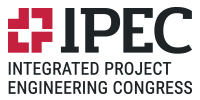Theme & Sub-Themes
The sub-themes for the Integrated Project Engineering Congress build on the congress theme of “Creating the Future Together”. These provide a framework for congress content tailored to build on lessons learnt from the past with a particular focus on the current and future priorities for Australia and the region.
Leading speakers within their field will cover themes:
- Capital Project and Lifecycle
- Sustainability and Resilience
- Technology and Data
- Human Systems and Culture
- Governance and Assurance
IPEC covers a range of topics relevant to practicing engineers, students, academics, researchers, government, defence and industry specialist providers. Examples of functional areas within each of the sub-themes are detailed below as a guide:
Capital Projects and Lifecycle

- Qualitative and Quantative Risk Assessment in Capital Projects
- Asset Optimisation and Management
- Risk Based Decision Making (RBDM) in project and Asset lifecycle
- Enterprise/ Integrated Project Management Office (e/iPMO)
- Contingency Management for Portfolio, Program and Project
- Integrated Project Controls and Reporting: Risk, Planning & Scheduling, Cost
- Whole of life view to Systems
- Complex Systems, Programs and Projects
- Education in Systems Concepts and Methodologies (Acquisition & Sustainment)
- Test and Evaluation
- Leadership & Management
Sustainability and Resilience

- Natural disasters and resilient infrastructure
- Sustainable Future (Climate Change, UN SDGs)
- Systems Approach to System Definition, Realisation, Sustainment and Disposal
- Holistic conceptual reference architectures for critical systems
- Life after/with COVID
- Education in systems concepts and methodologies
- Triple bottom line sustainability (profit, people, planet)
- Building resilience in individuals, teams and organisations
- Supportability, Reliability, Availability, Maintainability, Modifiability – retention of capability utility
- Agility – disruptive technologies, obsolescence, proofing and interoperability architectures
- Sovereign Capability
- Education and Training
- Leadership & Management
Technology and Data

- Data-driven Risk Analysis Methodologies
- New technologies, including AI/ML, in delivering major projects
- Integrated project controls
- Building information modelling (BIM)
- Autonomous driving, new transport modes and smart infrastructure
- Enterprise Risk Management (ERM)
- Agile, Interoperable Architectures & Standards
- Experimentation for Capability Definition, Design, Development, Test & Evaluation
- Systems and Data Security
- Modelling & Simulation, MBSE, Digital transformation of SE
- IP protection/ Management
- Education and Training
- Leadership & Management
Human Systems & Culture

- Diversity; age, gender, education, culture, thinking etc
- People build projects, not machines, software
- New norms on working on projects – WFH etc
- Education and Training
- Organisation and Project Culture
- Building high performing teams
- Social systems engineering
- Human Factors
- Health and Well being
- Artificial Intelligence/ Machine Learning
- Trusted systems, safety, security, privacy, ethics
- Collaborative contracts
- Work Health and Safety
- Leadership & Management
Governance and Assurance

- Risk-based audit, assurance & three lines of defence for major projects
- Whole of life approach – extending and establishing reference architectures
- Wholism – considering social, cultural, environmental, commercial, political, technological, biological and ethical dimensions
- Integrity by design
- Verification and validation
- Legal/ Regulatory frameworks, - safety, criticality, privacy
- Self regulation vs independent assurance
- Principles of good governance frameworks
- Link between good governance and leadership
- Critical role of Test and evaluation in governance and assurance
- Leadership & Management
